牛津上海版高二上英语 第1讲---让步状语从句及目的状语从句---教案
牛津版高二英语 Unit1课件

II. 现在时态基本(jīběn)形式
时态
主动
一般现在时 am/is/are; do/does
现在进行时 be (am/is/are) doing
现在完成时 have/has done
现在完成进 have/has been doing 行时
第九页,共50页。
II. 现在(xiànzài)时态基本形式
• They are going to the Academy Awards show in February.
…to talk about actions that are being planned , but will happen in the future.
第二十三页,共50页。
• You are always making the same
第二十页,共50页。
Story-telling:
Use the following as many as possible.
(the simple present tense)
once in a while; now and then;
nowadays; currently;
at present; as a rule;
mistakes!
• Sue is always changing her mind.
…to talk about actions that happen repeatedly, used with always, usually
with a negative connotation(涵义(hán yì)).
• Tell me__in_万_ca_s一_e_y(_wo_uà_n_g_yeī_t)_i你n_t_o有_d_麻i_ff_烦ic_u_l_ty__. • He will keep the work _n_不_o_管m__a发_tt_e生_r_(wf_āh_sa_ht_ēng)什
牛津上海版高二上英语第1讲---让步状语从句及目的状语从句---教案
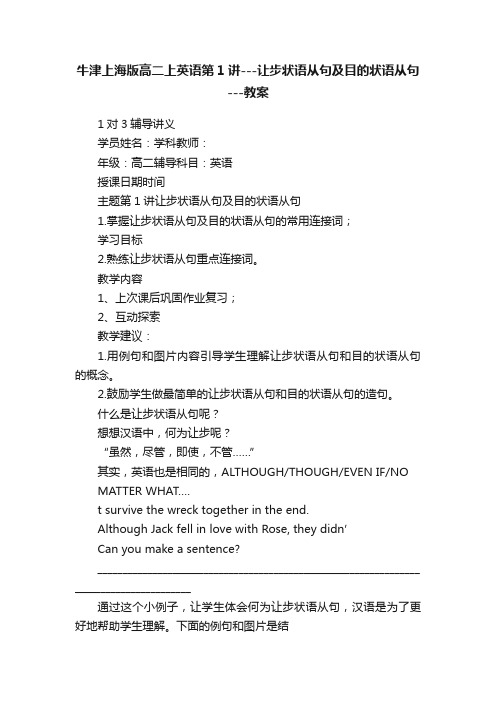
牛津上海版高二上英语第1讲---让步状语从句及目的状语从句---教案1对3辅导讲义学员姓名:学科教师:年级:高二辅导科目:英语授课日期时间主题第1讲让步状语从句及目的状语从句1.掌握让步状语从句及目的状语从句的常用连接词;学习目标2.熟练让步状语从句重点连接词。
教学内容1、上次课后巩固作业复习;2、互动探索教学建议:1.用例句和图片内容引导学生理解让步状语从句和目的状语从句的概念。
2.鼓励学生做最简单的让步状语从句和目的状语从句的造句。
什么是让步状语从句呢?想想汉语中,何为让步呢?“虽然,尽管,即使,不管……”其实,英语也是相同的,ALTHOUGH/THOUGH/EVEN IF/NO MATTER WHAT….t survive the wreck together in the end.Although Jack fell in love with Rose, they didn’Can you make a sentence?________________________________________________________________ _______________________通过这个小例子,让学生体会何为让步状语从句,汉语是为了更好地帮助学生理解。
下面的例句和图片是结合到一起的,加深学生的印象。
什么是目的状语从句呢?想想汉语中,何为目的呢?“为了,目的是……”在英语中,往往体现为SO THAT,IN ORDER THATI opened the window so that the fresh air could come in.Can you make a sentence?____________________________________________________________让步状语从句和目的状语从句的基本概念和用法让步状语从句【知识梳理1】让步状语从句的引导词1)Though和although: 都表示“尽管…”的意思批注:两者都当虽然讲,但从以上两个例句来看,两者且都可以与yet/still连用,但是不能与but连用。
上海牛津英语高二上册高二上Unit1U1同步讲义教案(含词汇语法练习)

学员编号:年级:高二课时数:学员姓名:辅导科目:英语学科教师:授课T单元知识同步 C (考点训练)T (基础知识,综合分析)类型授课日期时段教学内容一、Words and Phrases1.promise n. 许诺2.straight adj. 连续的,不间断的3.keep one’s word 遵守诺言4.despite prep. 不管,尽管5.shuttle n. 来往于两地间的火车、班车或航班6.resort n. 度假胜地;旅游胜地7.be dying to (do something) 渴望(做某事)8.scramble v. 争抢,推挤9.check in 到达并登记10.instructor n. 教练,指导者11.sideways adv. (斜)向一边;向旁边12.in case 以防13.to be honest 老实说14.definitely adv. 肯定They promised that all the books would be returned by Friday.他们保证所有的书籍会在周五之前归还。
【拓展】(1)promise n. 许诺;诺言;保证例:We received many promises of help.许多人答应帮助我们。
【必背】make a promise 做出允诺keep a promise遵守诺言fulfill a promise实现诺言carry out a promise履行诺言break a promise违背诺言(2)promise V.预示例:It promises to be fine tomorrow.明天有望是个好天气。
Heavy snow promises a harvest.瑞雪兆丰年。
(3)promising ad/.有前途的;有希望的例:The results of the first experiment are not very promising.第一次实验的结果不容乐观。
牛津上海版高二上英语 第1讲 让步状语从句及目的状语从句 教案
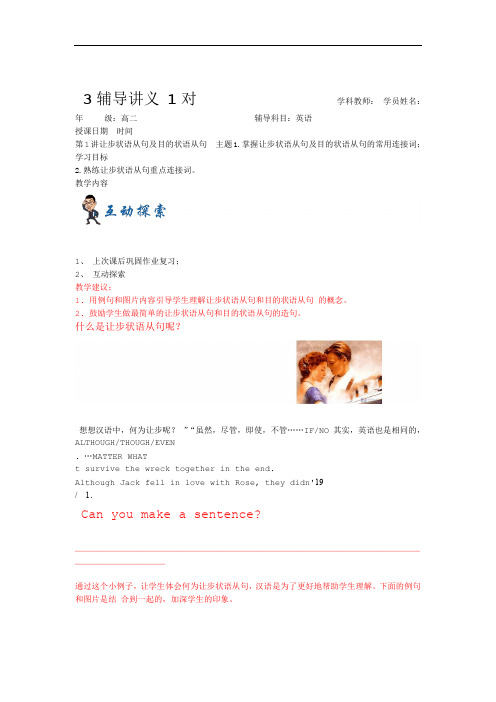
3辅导讲义 1对学科教师:学员姓名:年级:高二辅导科目:英语授课日期时间第1讲让步状语从句及目的状语从句主题1.掌握让步状语从句及目的状语从句的常用连接词;学习目标2.熟练让步状语从句重点连接词。
教学内容1、上次课后巩固作业复习;2、互动探索教学建议:1.用例句和图片内容引导学生理解让步状语从句和目的状语从句的概念。
2.鼓励学生做最简单的让步状语从句和目的状语从句的造句。
什么是让步状语从句呢?想想汉语中,何为让步呢?”“虽然,尽管,即使,不管……IF/NO 其实,英语也是相同的,ALTHOUGH/THOUGH/EVEN. …MATTER WHATt survive the wreck together in the end.Although Jack fell in love with Rose, they didn'19/ 1.Can you make a sentence?_____________________________________________________________________ __________________通过这个小例子,让学生体会何为让步状语从句,汉语是为了更好地帮助学生理解。
下面的例句和图片是结合到一起的,加深学生的印象。
什么是目的状语从句呢?想想汉语中,何为目的呢?“为了,目的是……”IN ORDER THAT 在英语中,往往体现为SO THAT,I opened the window so that the fresh air could come in.Can you make a sentence?______________________________________________ ______________19/ 2.19 / 3.D. so B. although C. for A. whether【参考答案】B Although引导让步状语【思路解析】句意为:尽管我很费力才将他叫醒,但Frank 坚持说他没有睡着。
牛津英语高二上U1教案1
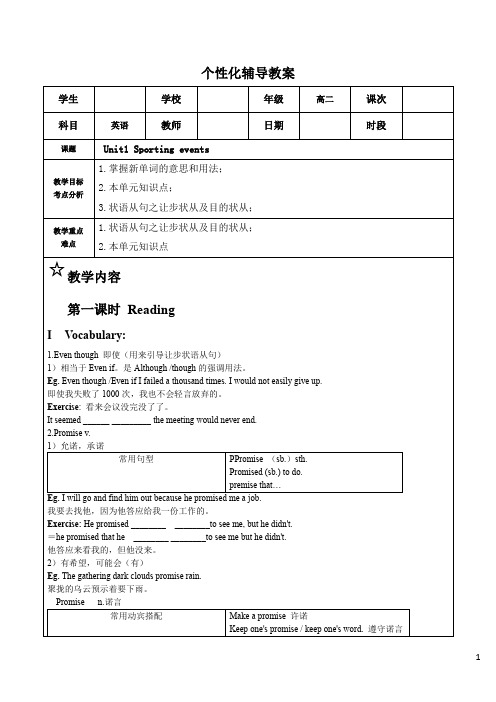
2)straight adj.直的,笔直的,直接的
Would you please give me a straight answer?请你给我个坦率的回答。
3)A's是A的复数形式。缩写、数字、字母的复数形式一般都以-'s结尾,有时也可直接加-s:
for the first time
在句子中单独做时间状语。不能引导状语从句。
the first time
名词词组用作连词,引导时间状语从句。其后不可加when。类似的还有:The moment,the instant,the second,the minute等。
He came to Shanghai for the first time.他第一次来上海。
MAs/MA's文学硕士;Some VIPs/VIP's重要人士
In the 1990s/1990's在20世纪90年代;
in his 50s/50's在他五十几岁时
They are two t's in the word letter.在“letter”这个单词里有两个“t”。
4.Keep one's word遵守诺言
10.In case conj.万一
Eg. Take an umbrell,in case it rains.带把伞以防下雨。
有时In case所引导的从句中还可以用should,但不能用will或shall。
Do remind me of the meeting in case I should forget.万一我忘记,你一定要提醒我开会这件事。
高中英语unit1Bodylanguage-grammar教案牛津上海版S1A
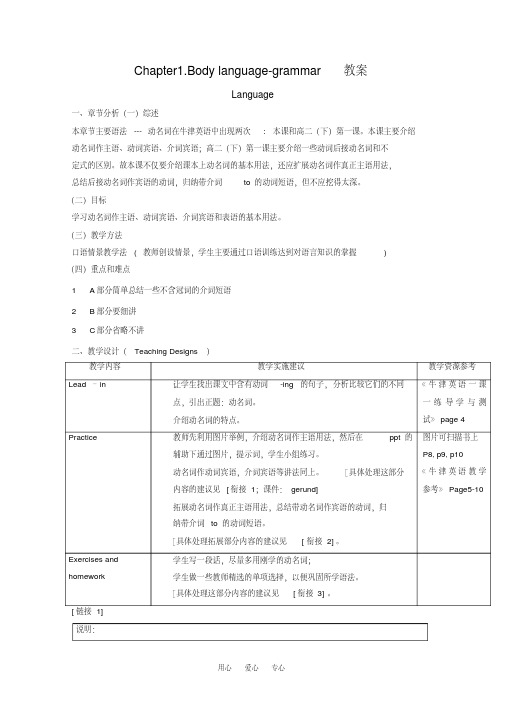
Chapter1.Body language-grammar教案Language一、章节分析(一)综述本章节主要语法---动名词在牛津英语中出现两次: 本课和高二(下)第一课。
本课主要介绍动名词作主语、动词宾语、介词宾语;高二(下)第一课主要介绍一些动词后接动名词和不定式的区别。
故本课不仅要介绍课本上动名词的基本用法,还应扩展动名词作真正主语用法,总结后接动名词作宾语的动词,归纳带介词to的动词短语,但不应挖得太深。
(二)目标学习动名词作主语、动词宾语、介词宾语和表语的基本用法。
(三)教学方法口语情景教学法( 教师创设情景,学生主要通过口语训练达到对语言知识的掌握)(四)重点和难点1A部分简单总结一些不含冠词的介词短语2B部分要细讲3C部分省略不讲二、教学设计(Teaching Designs)教学内容教学实施建议教学资源参考Lead –in 让学生找出课文中含有动词-ing的句子,分析比较它们的不同点,引出正题:动名词。
介绍动名词的特点。
《牛津英语一课一练导学与测试》page 4Practice 教师先利用图片举例,介绍动名词作主语用法,然后在ppt的辅助下通过图片,提示词,学生小组练习。
动名词作动词宾语,介词宾语等讲法同上。
[具体处理这部分内容的建议见[衔接1;课件:gerund]拓展动名词作真正主语用法,总结带动名词作宾语的动词,归纳带介词to的动词短语。
[具体处理拓展部分内容的建议见[衔接2]。
图片可扫描书上P8, p9, p10《牛津英语教学参考》Page5-10Exercises and homework学生写一段话,尽量多用刚学的动名词;学生做一些教师精选的单项选择,以便巩固所学语法。
[具体处理这部分内容的建议见[衔接3]。
[链接1] 说明:这是一份关于动名词的基础教学的教案与课件。
Step One lead-in1Ask students to find the sentences which have the form of v.+ing in the text .(possible answers):He gave an encouraging smile.Communicating is more than speaking and listening.She is holding her head up.2Explain the meaning and features of gerunds.Gerunds are –ing nouns. It is a kind of nouns. So in the above sentences, only“communicating, speaking, and listening” are gerunds. As a noun, gerunds canbe used as subject, verb object, preposition object, predicative and attributive. Step Two Presentation1Gerunds as subjects1)Example:T: What does shaking hands mean?S1: Shaking hands is a sign of friendship.S2: Shaking hands means that you are friendly.(动名词作主语时,位于动词用单数)2)PracticeStudents practise according to the example. They work in pairs. S1 makesquestions using the pictures and turning the verbs in brackets into –ing nouns. S2 chooses answers from the box.Shaking your fist is a sign of anger.Sighing is a sign of sadness.Yawning means that you are sleepy.Closing your eyes means that you are thinking.Whistling means that you are happy.Scratching your head means that you are thinking.Bowing is a sign of respect.(补充讲解句型It is (was) no use/good doing something.)2Gerund as verb objects1)Example:T: I didn’t know you could swim.S: Didn’t you? I love/ like swimming.T: So do I. I really enjoy swimming.I don’t. I hate / dislike swimming.I prefer walking.2)Practice:Students work in pairs to make similar dialogues about the pictures. Followthe example.3)Tell students some other verbs which have such usages.admit, appreciate, avoid, be worth, complete, finish, deny, delay, postpone,escape, practice, suggest, miss, allow, permit, forbid, consider, imagine3Gerunds after prepositionsOn her first day at work, Debbie saw the things. She didn’t know what they werefor, so she asked Mr Yang.Work in pairs to complete their conversation. S2 should answer S1, using –ing nouns made from the verbs in the box along with “for”.1)Example:T: Excuse me, but what are these _keys_____ for?S: They’re _for____ __locking_____ the drawers of the desk.2)Practice:Students work in pairs to make similar dialogues about the pictures. Followthe example.S1: And this _______?S2: It’s _______ ________ letters.S1: What about these _______ ________?S2: They’re _______ ________ your paper together.S1: This ________. What’s it for?S2: It’s _______ _______ the dates on documents.S1: And these ________?S2: They’re _______ ________. They’re a present for your first day at work.( 补充总结含介词to的动词短语:be (get)used to, get down to, look forward to, lead to, pay attention to, be devoted to, object to例如:Let’s get down to talking about your future.I’m look forward to hearing from you.)(见课件:gerund)[链接2]说明:这是动名词的拓展部分,拓展了动名词句型、接动名词做宾语的一些动词、接动名1下列句型后用动名词1)It’s no use / good doing…2)There is no point (in) doing …3)It’s worth doing…4)…can’t help doing…〖典型例句〗1)It’s no use crying over the spilt milk.2)The place is well worth visiting again.3)There is no point cheating in the exam.4)We can’t help laughing at the joke.5)It’s no good copying others’ homework.2下列动词后常接动名词做宾语1)admit, appreciate, avoid2)complete, consider3)delay, deny4)endure/stand, enjoy, escape, excuse5)finish6)imagine7)keep8)mind, miss9)postpone, practice10)resist, risk11)suggest巧记这些动词的诀窍:继续坚持勿停止;盼望完成莫推迟错过成功会后悔;惯于冒险须放弃避免原谅不逃脱;忙于欣赏禁不住介意练习很值得;考虑建议末延迟想象无用已无益;记得做过勿忘记禁止使用不定式〖典型例句〗1)I enjoy reading books in bed though it is not a good habit.2)I can’t imagine going to any place without you.3)Would you mind opening the door for me?4)He suggests reading English every day.5)The bird missed being shot.6)He escaped being punished by running away.3下列动词短语种to为介词1)be (get)used to2)get down to3)look forward to4)pay attention to5)be devoted to6)object to7)lead to〖典型例句〗1)I used to get up late, bu t now I’m used to getting up early.2)After discussing with his deskmate, he got down to writing his composition.3)I’m looking forward to hearing from you.以下几点可以在以后单元里讲解:1)need/ want / require 句型2)love, like, hate 后接 to do 与doing 作宾语的区别3)stop, remember, regret, try, mean, go on, forget后接 to do 与doing 作宾语的区別4)allow, permit, consider, advise后接 to do 与doing 作宾语和宾补的区别5)动名词的时态和语态6)动名词的复合结构[链接3]说明:Ⅰ单选:1.Do keeping _____, will you?A. to tryB. tryC. having triedD. trying2. We are all looking forward ______ Mr. Smith next week.A. to seeB. of seeingC. at seeingD. to seeing3. He spent all his time ______ for the final examination.A. to prepareB. of preparingC. in preparingD. to preparing4. The boy is only five years old, but he is quite used _____ the telephone.A. to answerB. to answeringC. of answeringD. by answering5. ______soundly is better for your illness than taking medicine.A. To sleepB. SleepingC. SleepD. Having slept6. Sometimes when I look into the sky, I feel like ______ a trip somewhere.A. to makeB. makingC. makeD. to go for7. I consider _____ of every fish is a kind of murder.A. takingB. a takingC. the takingD. to take8. My grandfather is a rich man, but ______ money does not solve all his problems.A. hasB. to haveC. havingD. having had9. It is no good ______ him to see you off.A. to expectB. expectingC. of expectingD. for him to expect10.There is one more book worth ______.A. readB. of readingC. being readD. reading11.He liked ______ many questions at the press conference.A. being askedB. askingC. of askingD. ask12.We had no trouble ______ the path through the forest.A. to findB. for findingC. findingD. with findingII.用括号里的动词的正确形式填空:1. He insisted on _______(do )the work in some other way.2. The windows want / need / require to be cleaned. That is, they need / want / require_____ (clean).3. He practiced _______(play) the piano every day.4. She doesn’t mind ______( work ) overtime.5. It will mean ______( benefit ) your company and mine.6. Have you decided to put off ______( go ) to the seaside?7. Peter kept (on) ______ (ask) questions.8. It’s a waste of time ______( argue) about it.9. _____ ( talk ) is easier than doing.10. Have you finished _______ (do) your homework?III.翻译:1. ______(每天晨读一刻钟)is very important in learning English.2. It’s no use _______(叹气).3. Debbie enjoys _______(微笑着与客户交流).4. John has just given up ______(吸烟).5. I ______(一直盼望着访问)China again.6. He run off to avoid ______(看见)by his class teacher.7. This machine is for ______(切纸).8. This book is well worth ______(读).9. ______(挥动拳头)is a sign of anger.10. Mr. Yang suggested/advised ______ (看着顾客的眼睛)to make a good impression on him.IV.拓展题:1.---You were brave enough to raise objections at the meeting.---Well, now I regret _____that.A. to doB. to be doingC. to have doneD. having done2.The patient was warned _____ oily food after the operation.A. to eat notB. eating notC. not to eatD. not eating3.She looks forward every spring to _____ the flower-lined garden.A. visitB. paying a visitC. walk inD. walking in4.The little time we have together we try _____ wisely.A. spending itB. to spend itC. to spendD. spending that5.While shopping, people sometimes can’t help ______ into buying something they don’t really need.A. to persuadeB. persuading D. being persuaded D. be persuaded6.What worried the child most was ______ to visit his mother in the hospital.A. his not allowingB. his not being allowedC. his being not allowedD. having not been allowed7.Tony was very unhappy for _____ to the party.A. having not been invitedB. not having invitedC. having not invitedD. not having been invited8._____ to sunlight for too much t ime will do harm to one’s skin.A. ExposedB. Having exposedC. Being exposedD. After being exposed9.The discovery of new evidence led to _____.A. the thief having caughtB. catch the thiefC. the thief being caughtD. the thief to be caught10.One learns a language by making mistakes and _____ them.A. correctB. correctingC. correctsD. to correct11.---You should have thanked her before you left.---I meant _____, but when I was leaving I couldn’t find her anywhere.A. to doB. toC. doingD. doing12.In some parts of London, missing a bus means_____ for another hour.A. waitingB. to waitC. waitD. to be waiting13.---What’s made John so angry?---______ the tickets for the concert.A. LoseB. To loseC. Because of losingD. Losing14. The day we are looking forward to _______ at last.A. arrivingB. arriveC. arrived D. arrives15. Mr. Reed made up his mind to devote all he had to ____ some schools for poor children.A. set upB. setting upC. have set upD. having set up附答案:Ⅰ.单选:DDCBBBCCBDBCⅡ.用括号里的动词的正确形式填空:doing, cleaning, playing, working, benefiting,going, asking, arguing, Talking, doing Ⅲ.翻译:1.Reading for a quarter of an hour every morning2.sighingmunicating with customers with a smile4.smoking5.am looking forward to visiting6.being seen7.cutting up paper8.reading9.Shaking one’s fist10.looking at customers’ eyesⅣ.拓展题:DCDBD BDCCB BADCB。
上海牛津英语高二第一学期上海牛津英语高二第一学期教案

上海牛津英语高二第一学期上海牛津英语高二第一学期教案一、单元分析(UnitAnalyi)(二)单元目标(UnitTarget)分清定语从句各个关系代词和关系副词的用法,熟练运动定语从句进行描述和会话。
学会依照空间顺序进行写作,描述一个地方。
能运用一些词语和句型描绘航天知识和自己的感受。
;二、运用空间顺序来描述一个地方,可让学生自习完成,并通过书本相关练习加以反馈,使教师了解学生的掌握程度。
第83页Writing5Structure定语从句的复习是本课的语法教学内容。
教师可由学生自主归纳定语从句的知识点,并通过例句和对比加以补充和总结。
【链接3】定语从句复习着重知识点的一些教学建议。
课本第77页tructure6AdditionalReading本部分内容与Unit5课文内容直接相关,可作为辅助补充读物,让学生课后完成阅读。
建议教师在学生自我阅读之后着重指出一些词和词组让学生记忆:befacinatedby,dreamabout,getinvolvedin,dieaway,makeendmeet,keepa harpeyeon…针对“航空员应该具备的素质”这一话题,可在学生中开展讨论。
【链接4】话题讨论的一些教学建议。
课本第85页AdditionalReading说明:利用“头脑风暴”的教学手段,是一种提供学生积极思维的好机会,结合小组合作的方式,让学生列出尽可能多的关于“宇宙”的词汇(可根据词性分类)。
这一环节的运用既让学生通过回忆和启发回顾了曾经学过的有关“宇宙”的词汇,发挥学生的积极主动性以及小组间的合作性,又可引出和补充一些新的词汇,课文中的新词可以在这个环节上初步让学生有所认识。
【链接1】1.教师在黑板上写下“SpaceE 某ploration”,并提问“Whatoccurinyourmindimmediatelywhenyoueethitopic”2.在“头脑风暴”的过程中,教师鼓励学生列出尽可能多的关于“宇宙”的词汇,并在黑板上分类“noun”,“adj.”“verb”三栏。
牛津上海版高二英语上册同步教案 第1讲 定语从句
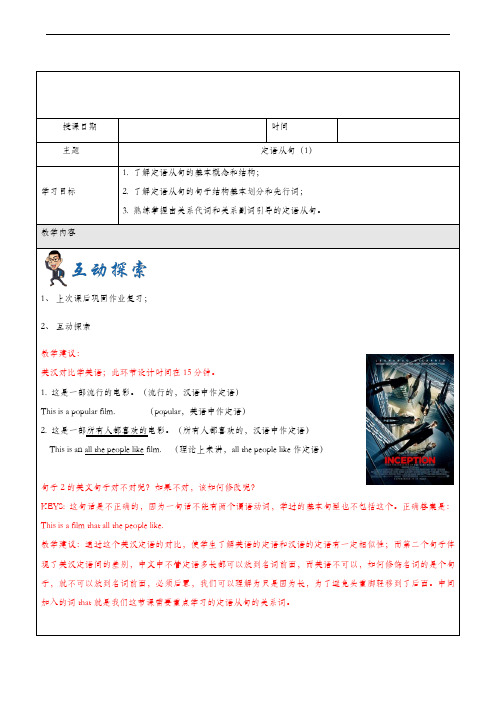
这句话是不正确的,因为一句话不能有两个谓语动词,学过的基本句型也不包括这个。
正确答案是:
教学建议:通过这个英汉定语的对比,使学生了解英语的定语和汉语的定语有一定相似性;而第二个句子体现了英汉定语间的差别,中文中不管定语多长都可以放到名词前面,而英语不可以,如何修饰名词的是个句子,就不可以放到名词前面,必须后置,我们可以理解为只是因为长,为了避免头重脚轻移到了后面。
中间
此环节教案预期时间20(练题)
可以从以下几点进行总结:
1.定语从句的引导词:
教学建议:
教学建议:。
上海牛津版高二上册英语Unit1 my favorite sportlistening ,speaking and writing教案S2A

Chapter1. My Favorite Sport-SkiingListening, Speaking, Writing一、章节分析(Section Analysis )(一) 综述本部分是培养学生语言运用能力,通过听,说,写方面的训练,不仅能提高学生语言词汇方面的能力,而且通过教师有意识的知识输入,使他们运用语言知识来表达思想感情的能力得到加强。
(二)目标Listening本章节Understanding numbers侧重锻炼学生对听数字的快速反应和准确性。
Speaking1.学会在口语中使用简略形式2.学会在调查一项任务中运用英语语言,并且如何运用所知的数据表达观点。
Writing1学会看清各幅图画所要表达的意思以及图画之间的联系。
2学会列出具有连贯性写作的计划。
3能够完整,连贯,生动地叙述一个故事。
(三)重点和难点Listening准确地获取相关体育运动开展的时间,地点,参加人数,分组等细节信息。
Speaking在小组成员表现各异的情况下,学会引导讨论顺利进行,并能够根据调查所得的数据来组织有效的语言,清晰的表达观点。
Writing根据提示写出一项计划。
二、教学设计(Teaching Designs)[链接1]Listening1Pre-listening (page 7, page 17)1) Warm up activity(Design a dictation of numbers so as to make the students respond quickly to different numbers.)✁ In the last year, The consumption of fast food in KFC reaches 6759,00 tons, according to one food expert.✁At dawn on September 5th, 1972 a band of “Black September” Arab terrorists broke into the Israeli building in the Olympic village near Munich where 12,850 athletes were staying.✁ The shop owner charged me 1263.5 RMB for that motorbike.✁ There were 179 volunteers for this campaign against smoking including 29 teenagers, 78 college students and 72 senior citizens.2) Introduce the task to the students, and ask students to recognize the key words;2. While listening1)According to the table, predict a possible order.2)Listen to the passage, and fill in the blanks.3.Post-listeningAfter listening , ask students to write a short piece of story, try to include as many numbers as possible.SpeakingStep one: (saying contracted forms)Read words in Exercise A1 and demonstrate the correct sounds. Students practice repeating the sounds individually, in groups of and chorally. Listen to some individual students to check their pronunciation.Step two: (A survey about physical fitness)(1) Ask students to work in pairs. S1 reads out the questions, S2 must not look at his/her book at this time. S2 must listen carefully to S1`s words. S2 must give honest answers.(2) The pairs then split up, and form new pairs, but with different roles. Now the original S1 must become S2, and give the answers.(3) Exercise B2, students should form into groups of about four to six, and calculate the group`s average score. They should then discuss their score, and suggest ways in which they could become fitter. Finally, for Exercise B3, one person from each group can report to the whole class. A model is given in their books.[链接2]WritingStep One Pre-writing --- to introduce the importance of making a plan●Students should first be informed that it is necessary to plan the writing before you actuallywrite an article.●To skim the passage on Page15 Badminton to extract the main lists of ideas.Step Two While-writing●Students should follow the plan and put the extracted ideas in the right order.●Students should discuss the above plan, and show how the same plan can be used for otherpieces of writing.●Discuss Exercise A2 orally. Fast students can attempt an original piece of writing. Others canuse the notes provided and the model in Exercise A1.Step Three Post-writing●Each of the students should make a written plan about A2 and then discuss them in their groupsnext time.。
高中英语 Unit1 sporting eventsgrammar学案 上海牛津版S2A
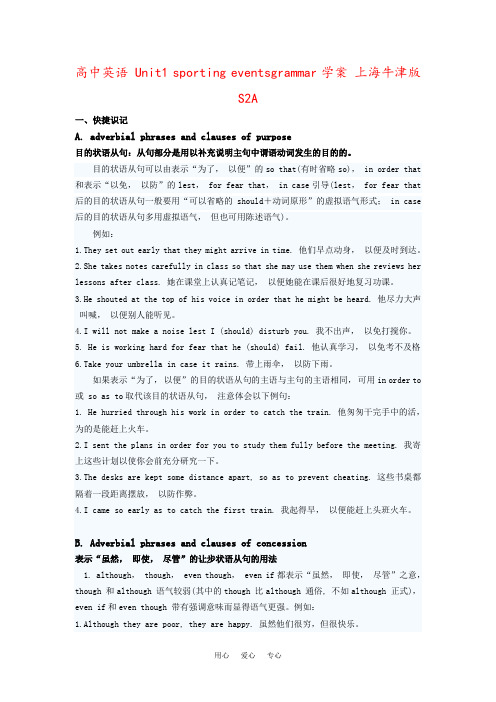
高中英语 Unit1 sporting eventsgrammar学案上海牛津版S2A一、快捷识记A. adverbial phrases and clauses of purpose目的状语从句:从句部分是用以补充说明主句中谓语动词发生的目的的。
目的状语从句可以由表示“为了,以便”的so that(有时省略so), in order that 和表示“以免,以防”的lest, for fear that, in case引导(lest, for fear that 后的目的状语从句一般要用“可以省略的should+动词原形”的虚拟语气形式; in case 后的目的状语从句多用虚拟语气,但也可用陈述语气)。
例如:1.They set out early that they might arrive in time. 他们早点动身,以便及时到达。
2.She takes notes carefully in class so that she may use them when she reviews her lessons after class. 她在课堂上认真记笔记,以便她能在课后很好地复习功课。
3.He shouted at the top of his voice in order that he might be heard. 他尽力大声叫喊,以便别人能听见。
4.I will not make a noise lest I (should) disturb you. 我不出声,以免打搅你。
5. He is working hard for fear that he (should) fail. 他认真学习,以免考不及格6.Take your umbrella in case it rains. 带上雨伞,以防下雨。
如果表示“为了,以便”的目的状语从句的主语与主句的主语相同,可用in order to 或 so as to取代该目的状语从句,注意体会以下例句:1. He hurried through his work in order to catch the train. 他匆匆干完手中的活,为的是能赶上火车。
牛津上海版高中二年级第一册英语 Unit 1 Sporting events 教案设计 (有答案)
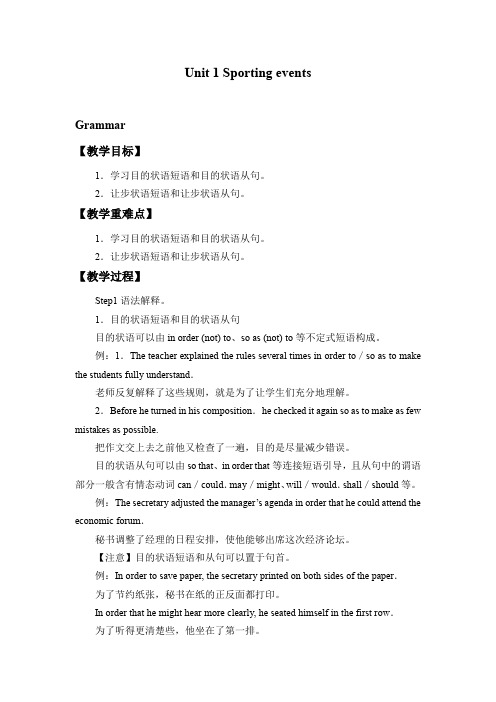
Unit 1 Sporting eventsGrammar【教学目标】1.学习目的状语短语和目的状语从句。
2.让步状语短语和让步状语从句。
【教学重难点】1.学习目的状语短语和目的状语从句。
2.让步状语短语和让步状语从句。
【教学过程】Step1语法解释。
1.目的状语短语和目的状语从句目的状语可以由in order (not) to、so as (not) to等不定式短语构成。
例:1.The teacher explained the rules several times in order to/so as to make the students fully understand.老师反复解释了这些规则,就是为了让学生们充分地理解。
2.Before he turned in his composition.he checked it again so as to make as few mistakes as possible.把作文交上去之前他又检查了一遍,目的是尽量减少错误。
目的状语从句可以由so that、in order that等连接短语引导,且从句中的谓语部分一般含有情态动词can/could.may/might、will/would.shall/should等。
例:The secretary adjusted the manager’s agenda in order that he could attend the economic forum.秘书调整了经理的日程安排,使他能够出席这次经济论坛。
【注意】目的状语短语和从句可以置于句首。
例:In order to save paper, the secretary printed on both sides of the paper.为了节约纸张,秘书在纸的正反面都打印。
In order that he might hear more clearly, he seated himself in the first row.为了听得更清楚些,他坐在了第一排。
上海牛津版高二上册英语Unit1 sporting eventsreading教案S2A

Unit1 sporting events-reading教案Teaching Aims:1、Enhance students’ reading abilities.2、 Enable Ss to adopt the reading strategy and catch the main idea of the text. Teaching Important Points:1、 Help Ss know some background knowledge about sports,such as football, basketball, skiing.etc..2、 Help them learn some language points.Teaching methods:1. Improve the students’ reading comprehension.1. Practic e to get the students master what they’ve learnt.2. Discussion to make every student work in class.Teaching aids:1. the multi-media2. the blackboard.Teaching Procedures:Step1 Lead- in1.Show pictures about some sports to motivate the Ss’ enthusiasm.2.Talk about the sports and encourage the students to share their information and express their opinions.As we all know, there are many kinds of sports in our life, football,basketball,volleyball , swimming and so on.How much do you know about these sports, for example, its history, ceremonies and sporting events?1.which of these sports are popular in your city?why?2.what adjectives would you use to describe these sports and people?3.which sports do you like or dislike?why?Step 2. Fast readingAsk Ss to scan the article and answer the three questions in Part C.1 what kind of marks did she get in her exams?she got straight’s2 what are the names of the two places in South Korea?Seoul and Muju Resort3 until what time did they watch people skiing?10 p.m.4 what happens when you cross the tips of your skis?you will fall if you cross it5 how will she earn money to go skiing again?Do some part-time jobsStep 3 Careful reading1.find words in the essay to replace the italicized words in the sentences below.write the correct words in each blank.1)the young boy was happy because his mother told him she would surely take him swimming at the weekend.(paragraph1) keep one’s word2) In bowling, the ball usually travels in the same direction in which your feet areaimed. .(paragraph5) point3) It is considered polite in the west to pass your legs over each other when you are seated. (paragraph5) cross4)Though the pizza was huge, the young boy succeed in eating it up all by himself. (paragraph6) Manage to do2.find these words in the essay, and then use them to replace the words in brackets.write thewords in the blanks.Definitely, check in, slopes, resort, suits·spend five days in a wonderful (1) (place to go for a holiday)·arrive in Muju by bus, where you will(2) (enter and fill in a form)at one of the excellent hotels.·you will have lots of time to go skiing on the (3) (sides of hills)·there are instructors who can show you how to ski(4) (clothing worn for an activity)·it will (5) (certainly) be a vacation you will always remember!Answers: 1 resort 2 check in 3 slopes 4 suits 5definitely3 read and think(page5)Answers:cbadcStep 4. Discussion1.Do you like skiing?how much do you know about it? If not, which sports do you like best,why?Step 5 Language points1)promise 答应,许诺。
上海英语高二牛津上Unit1语言点学生版.docx
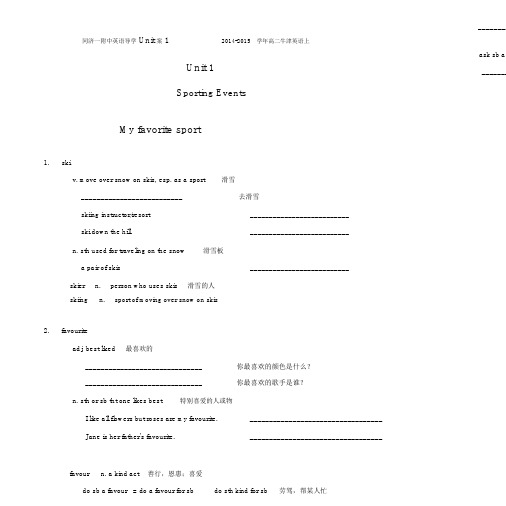
同济一附中英语导学 Unit案 12014-2015学年高二牛津英语上Unit 1Sporting EventsMy favorite sport1.skiv. move over snow on skis, esp. as a sport滑雪__________________________去滑雪skiing instructor/resort__________________________ski down the hill__________________________ n. sth used for traveling on the snow滑雪板a pair of skis__________________________skier n. person who uses skis滑雪的人skiing n.sport of moving over snow on skis2.favouriteadj. best liked最喜欢的______________________________你最喜欢的颜色是什么?______________________________你最喜欢的歌手是谁?n. sth or sb tht one likes best特别喜爱的人或物I like all flowers but roses are my favourite.__________________________________Jane is her father's favourite.__________________________________favour n. a kind act善行,恩惠;喜爱do sb a favour = do a favour for sb do sth kind for sb劳驾,帮某人忙________ask sb a _______同济一附中英语导学Unit案 12014-2015学年高二牛津英语下advantageous有利的,合适的a favourable answer________________________________a favourable day for skiing________________________________3.promisev. assure (sb) that one will give or do or not do sth诺许(sb) sth ?promise sb to do ?sb that ?父亲答应带我过一个特殊的期假My father promised ____________________________________.( 用双宾语 ) My father promised ____________________________________.(用不定时)My father promised ____________________________________.(用从句 )n. make a promise作出承诺keep one ’spromise = keep one’sword_________________carry out one ’spromise_________________break one ’spromise=break one’sword_________________ promisev. make sth likely预示;给予?的希望; 使人有 ?的指望__________________________________阴云预示有雨。
牛津上海英语高二第一学期Unit1reading课件(共22张PPT)
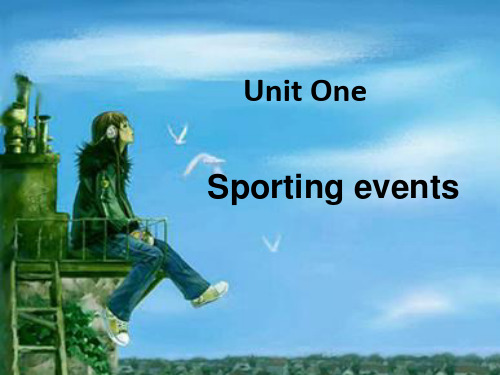
Skimming:
1.How much skiing experience does the writer have? Four days
2. What does the writer probably do?
She is probably a student.
3.What does the writer think of skiing?
2nd learning
doing longer __r_u_n_s__
day result: definitely _i_m_p_r_o_v_e_d, successful
How to ski
• Equipment:
ski suits, skis, ski boots, ski goggles etc.
➢他们两个我并不都认识。
I don’t know both of them.
Comp.
I know neither of them.
2. Wearing skis for the first time makes you feel very
strange.
动名词作主语
for the first time 单独做时间状语,不引导状语从句
to sum up speaking of generally speaking
总而言之
说道、提及
一般而言
frankly/honestly speaking 坦白地/老实说
•The kids are really looking forward to the visit to
the ___b_o_t_a_n_i_c_a_l_g__a_r_d_e_n__, where they can feast
上海牛津版高二上册英语Unit1 my favorite sport skiinggrammar教案 S2A(1)
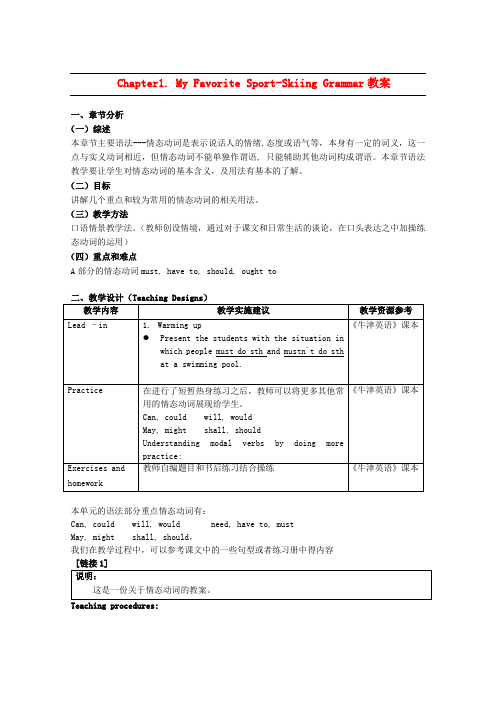
Chapter1. My Favorite Sport-Skiing Grammar教案一、章节分析(一)综述本章节主要语法---情态动词是表示说话人的情绪,态度或语气等,本身有一定的词义,这一点与实义动词相近,但情态动词不能单独作谓语, 只能辅助其他动词构成谓语。
本章节语法教学要让学生对情态动词的基本含义,及用法有基本的了解。
(二)目标讲解几个重点和较为常用的情态动词的相关用法。
(三)教学方法口语情景教学法。
(教师创设情境,通过对于课文和日常生活的谈论,在口头表达之中加操练态动词的运用)(四)重点和难点A部分的情态动词must, have to, should, ought to二、教学设计(Teaching Designs)本单元的语法部分重点情态动词有:Can, could will, would need, have to, mustMay, might shall, should,我们在教学过程中,可以参考课文中的一些句型或者练习册中得内容[链接1]Teaching procedures:Step one:Present the students with the situation in which people must do sth and mustn`t do sth at a swimming pool.Examples:1. Excuse me, you must not smoke2.You must not dive3.You must not flight.4.You must wear a swimming costume5. You must shower before enteringStep Two:(在进行了短暂热身练习之后,教师有意识地将书中其他使役情态动词have to, ought to, ought not to 的用法呈现给学生。
)1. “have to” practice Present students with Exercise A2, asking them to make a dialogueS1: When does Rocky have to get up in the morning?S2: He has to get up at 4a.m.S1: What do Smiley and Moaner have to do while Rocky is running?S2: They have to cycle with Rockey.2. “Ought to, ought not to” practice (P10)S1: Ought he to throw his racket in the air?S2: No, he ought not to throw his racket in the air.S1: Ought he be rude to his opponent?S2: No, he ought not to be rude to his opponent.(这部分是按照书上的情景对话,让学生在情景中自然的使用了情态动词,这种练习比较生活化,对学生来说也比较简单,但是还不足以掌握情态动词的更加深入的用法,所以在下一个步骤,教师有必要将主要的情态动词做系统讲解。
牛津上海版高二英语-状语从句二(自制,超好用)教师版
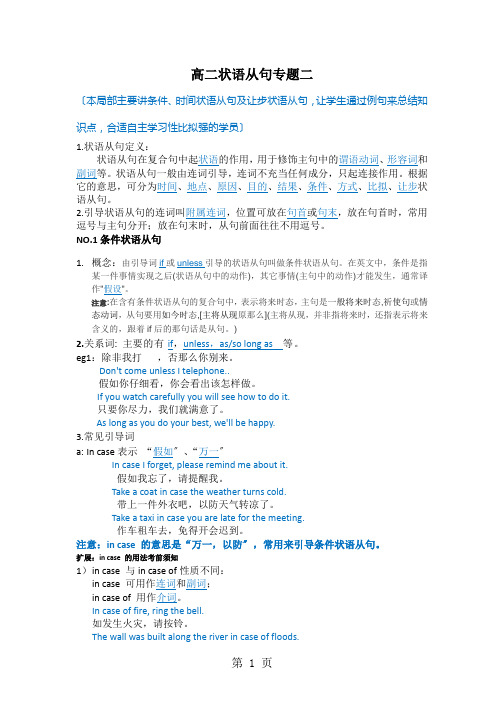
高二状语从句专题二〔本局部主要讲条件、时间状语从句及让步状语从句,让学生通过例句来总结知识点,合适自主学习性比拟强的学员〕1.状语从句定义:状语从句在复合句中起状语的作用,用于修饰主句中的谓语动词、形容词和副词等。
状语从句一般由连词引导,连词不充当任何成分,只起连接作用。
根据它的意思,可分为时间、地点、原因、目的、结果、条件、方式、比拟、让步状语从句。
2.引导状语从句的连词叫附属连词,位置可放在句首或句末,放在句首时,常用逗号与主句分开;放在句末时,从句前面往往不用逗号。
NO.1条件状语从句1.概念:由引导词if或unless引导的状语从句叫做条件状语从句。
在英文中,条件是指某一件事情实现之后(状语从句中的动作),其它事情(主句中的动作)才能发生,通常译作"假设"。
注意:在含有条件状语从句的复合句中,表示将来时态,主句是一般将来时态,祈使句或情态动词,从句要用如今时态,[主将从现原那么](主将从现,并非指将来时,还指表示将来含义的,跟着if后的那句话是从句。
)2.关系词: 主要的有if,unless,as/so long as 等。
eg1:除非我打,否那么你别来。
Don't come unless I telephone..假如你仔细看,你会看出该怎样做。
If you watch carefully you will see how to do it.只要你尽力,我们就满意了。
As long as you do your best, we'll be happy.3.常见引导词假如我忘了,请提醒我。
Take a coat in case the weather turns cold.带上一件外衣吧,以防天气转凉了。
Take a taxi in case you are late for the meeting.作车租车去,免得开会迟到。
注意:in case 的意思是“万一,以防〞,常用来引导条件状语从句。
牛津上海版高二英语-状语从句一(自制,超好用)教师版
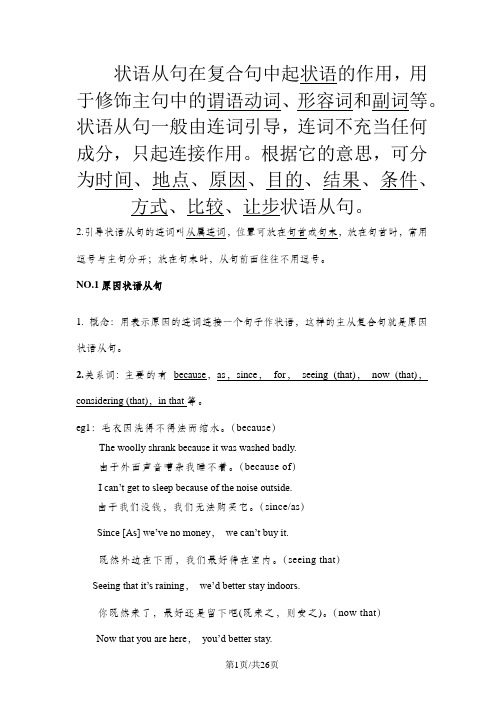
状语从句在复合句中起状语的作用,用于修饰主句中的谓语动词、形容词和副词等。
状语从句一般由连词引导,连词不充当任何成分,只起连接作用。
根据它的意思,可分为时间、地点、原因、目的、结果、条件、方式、比较、让步状语从句。
2.引导状语从句的连词叫从属连词,位置可放在句首或句末,放在句首时,常用逗号与主句分开;放在句末时,从句前面往往不用逗号。
NO.1原因状语从句1.概念:用表示原因的连词连接一个句子作状语,这样的主从复合句就是原因状语从句。
considering (that),in that等。
eg1:毛衣因洗得不得法而缩水。
(because)The woolly shrank because it was washed badly.由于外面声音嘈杂我睡不着。
(because of)I can’t get to sleep because of the noise outside.由于我们没钱,我们无法购买它。
(since/as)Since [As] we’ve no money,we can’t buy it.既然外边在下雨,我们最好待在室内。
(seeing that)Seeing that it’s raining,we’d better stay indoors.你既然来了,最好还是留下吧(既来之,则安之)。
(now that)Now that you are here,you’d better stay.注意:除以上提到的大家比较熟悉的引导原因状语从句的从属连词外,when有时也可引导原因状语从句(when表示“既然”)既然你不想听,我就不告诉你了。
(when)I won’t tell you when you won’t listen.3.连接词a: because特点:一般放于主句之后,because表示直接原因,语气最强,最适合回答why引导的疑问句。
例如:我做这件事是因为我喜欢。
I do it because I like it.b: since特点:引导的原因状语从句一般放于主句之前表示已知的、显然的理由(通常被翻译成“既然”),较为正式,语气比because弱。
- 1、下载文档前请自行甄别文档内容的完整性,平台不提供额外的编辑、内容补充、找答案等附加服务。
- 2、"仅部分预览"的文档,不可在线预览部分如存在完整性等问题,可反馈申请退款(可完整预览的文档不适用该条件!)。
- 3、如文档侵犯您的权益,请联系客服反馈,我们会尽快为您处理(人工客服工作时间:9:00-18:30)。
1对3辅导讲义学员姓名:学科教师:年级:高二辅导科目:英语授课日期时间主题第1讲让步状语从句及目的状语从句1.掌握让步状语从句及目的状语从句的常用连接词;学习目标2.熟练让步状语从句重点连接词。
教学内容1、上次课后巩固作业复习;2、互动探索教学建议:1.用例句和图片内容引导学生理解让步状语从句和目的状语从句的概念。
2.鼓励学生做最简单的让步状语从句和目的状语从句的造句。
什么是让步状语从句呢?想想汉语中,何为让步呢?“虽然,尽管,即使,不管……”其实,英语也是相同的,ALTHOUGH/THOUGH/EVEN IF/NOMATTER WHAT….Although Jack fell in love with Rose, they didn’t survive the wreck together in the end.Can you make a sentence?_______________________________________________________________________________________通过这个小例子,让学生体会何为让步状语从句,汉语是为了更好地帮助学生理解。
下面的例句和图片是结合到一起的,加深学生的印象。
什么是目的状语从句呢?想想汉语中,何为目的呢?“为了,目的是……”在英语中,往往体现为SO THAT,IN ORDER THATI opened the window so that the fresh air could come in.Can you make a sentence?____________________________________________________________Whatever happened, he would not mind.【例题精讲】例1.F rank insisted that he was not asleep _____ I had great difficulty in waking him up.A. whetherB. althoughC. forD. so【参考答案】B【思路解析】句意为:尽管我很费力才将他叫醒,但Frank坚持说他没有睡着。
Although引导让步状语从句。
例2.______ the police thought he was the most likely one, since they had no exact proof about it, they could not arrest him.A. AlthoughB. As long asC. If onlyD. As soon as【参考答案】A【思路解析】根据句意, 引导让步状语从句。
故选A。
例3.T____, he talks a lot about his favorite singers after class.A. A quiet student as he may beB. Quiet student as he may beC. Be a quiet student as he mayD. Quiet as he may be a student【参考答案】B【思路解析】As作引导让步状语从句的连词时, 从句中的表语要提到as之前。
如果表语是单数可数名词,名词前的不定冠词要省去。
【答案】B。
例4.To show our respect, we usually have to take our gloves off ______ we are to shake hands with.A.whicheverB.wheneverC.whoeverD.wherever【参考答案】C【思路解析】句意为“我们不论是跟谁握手的时候,我们常常将手套取下,以示尊敬。
”shake hands withsb.表示“与某人握手”,本句中with后缺少宾语,结合句意选C项,whoever在句中引导让步状语从句。
例5.______the Internet is of great help, I don’t think it’s a good idea to spend too much time on it.A. As i have read muchB. Now that I have read so muchC. Much as I have readD. As I have read so much7. _______ we want to help each other, we should point out each other's shortcomings.A. Now thatB. AlthoughC. UnlessD. When8.—Did you enjoy yourself at the party?—Yes,I didn't know anybody.A. evenB. even thoughC. as ifD. as though9. _______ difficulties we meet, we will always keep on trying to do our best.A. HowB. HoweverC. WhatD. Whatever10.NaughtyTom is, he is never latehis homework.A. as; forB. though; withC. that; byD. while; with11.The landowners in India would not vote to lose their land and wealth,it resulted____________ a fairer society.A. whether; ofB. even though; ofC. as if; inD. even if; in12.No matter how, he couldn't do any better.A. he worked hardB. hard he workedC. hardly he workedD. he worked hardly13.My father doesn't want to buy a car now,he needs one in fact.A. butB. soC. becauseD. though14.Shanghai many times, but he still doesn't know the city very well.A. He has been toB. He has gone toC. Though he has been toD. Having been to15.life in a poor country can be difficult, it can broaden a person's view of the world.A. IfB. AlthoughC. BecauseD. When16.it is that you've found, you must give it back to the person it belongs to.A. ThatB. BecauseC. WhateverD. However17.He gave up the hope of passing the examinationhe had already failed it twice.【思路解析】流行音乐是我们社会的那么重要的一部分以至于已经影响了我们的语言。
这说明流行音乐带来的结果,本句是结果状语从句。
结果状语从句的连词有:so that,so…that,such…that.结果状语放在主句之后。
注意:在so…that,such…that结构中一般成分齐全。
这也是与as引导定语从句的区别。
在so…as,such…as这一结构中,as引导定语从句,在句中做成分例2.I’d like to arrive 20 minutes early I can have time for a cup of tea.A.as soon asB.as a resultC.in caseD.so that【参考答案】D【思路解析】句意为:我早到20分钟的目的是能有时间喝点茶。
as soon as一……就……, 引导时间状语从句;as a result结果;in case以免, 万一(发生……)。
故【答案】为so that。
例3.John may phone again tonight. I don't want to go outhe phones.A. as long asB. in order thatC. in caseD. so that【参考答案】C【思路解析】句意为:我不想出门以防万一他打电话。
例4.The couple constantly warned them not to play near the river______ unexpected things happened.A. in case ofB. despiteC.in order thatD. for fear that【参考答案】D【思路解析】for fear that后接句子,表示唯恐。
【巩固练习】一、翻译下列句子。
1.万一家具在大火中毁掉了,保险公司是否会支付所有的损失?(in case) (14闸北一模)2.如今很多蔬菜种植在温室里而不是菜园里,为的是不受风雨和昆虫的侵害。
(so that) (12浦东一模)3.为了能陪伴孩子度过珍贵的童年时期,许多妈妈放弃了前景良好的职业生涯。
(give up)4.为了保持健康,我们经常参加体育锻炼。
(To…)5.现在世界上越来越多的国家正采取措施来吸引更多的中国游客。
(attract)Keys:1. Will the insurance company pay for all the damages in case the furniture is destroyed in the fire?2. Today many vegetables are grown/planted not in gardens but in greenhouses so that they can be protected from/ against wind, rain and insects.3. In order to accompany their kids through the precious childhood, many mothers have given up their work career of promising prospect.4. To keep fit, we often take part in physical exercise.5. More and more countries in the world are now taking measures to attract more Chinese tourists.此环节教案预期时间20(练题)+15(互动讲解)分钟。
